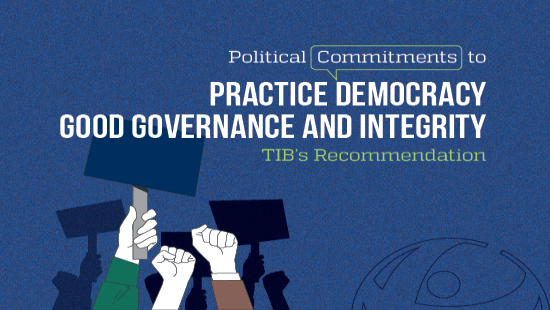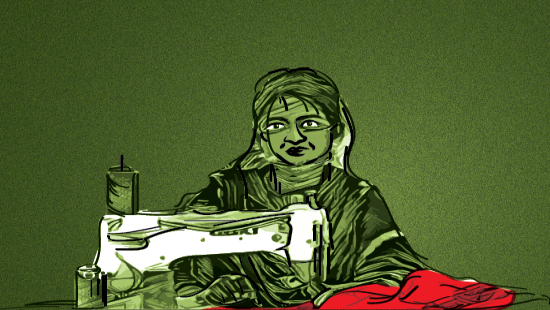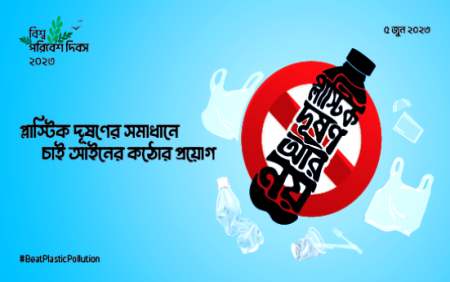Published: 18 October 2012
Asked Questions and Their Answers
Question 1: What is the objective of TIB to conduct this study? Was there an effort to undermine the Parliament through this study?
Answer:Before the 9th Parliament election, the two major political parties in their electoral manifestos had committed in making the parliament effective. However, in the three years following the formation of the 9th Parliament, different studies on MPs’ performance inside the Parliamenthave come out with the findings that the MPs were not doing at an expected level. Moreover, reports came out in the media on the MPs’ negative activities outside the Parliament. However, there is a dearth of a systematicresearch on the activities of MPs outside the Parliament. In this context the present research was initiated as a part of TIB’s regular research on strengthening democratic institutions in the country. In this study, an effort has been made to assess MPs’ activities both inside and outside the Parliament.
In this study no comment has been made on the Parliament, only the MPs’ activities have been reviewed. So the issue of undermining the Parliament is irrelevant. On the contrary, the underlying objective of undertaking such a study is to help make our parliamentary system more effective through review of existing deficiencies and providing policy recommendations based on study findings.
Question 2: What is the background of this study? What is the method? How the MPs have been selected?
Answer:After the formation of the 9th Parliament, it is observed in different studies that the MPs are not performing as it was expected (Rossette et al, 2011; Jahan, 2011). The reasons behind the Parliament not being effective as identified include regular absence of MPs in the Parliament, their minimum level of participation in the law enacting process, and failure to hold the government accountable. Moreover, their alleged involvement in extra-legal activities, abuse of power and irregularities, and also in many of the cases the apparent impunity (i.e. lack of any measure against their corrupt activities) they have been enjoying, particularly with respect to their performanceoutside of the parliament, made their transparency and accountability questionable. According to news published in various national dailies during the period January 2009 through September 2012, it was found that news alleging various corrupt activities have been published regarding 181 MPs (51.7% of all the MPs). At this backdrop this study was undertaken. It was observed from the information from the field that MPs are engaged in positive as well as some negative activities.
The present study is based on the analyses of primary and secondary data. Information on the participation in the Parliament was taken from the Parliament Watch report of TIB. Qualitative data collection techniques were usedto collect primary data on MPs’ activites outside the Parliament. . A total of 42 districts was selected where the total number of constituencies was 220. Information on 149 MPs was collected through 44 group discussions in these 42 districts comprising local people who are educated, aware, informed and apolitical. A total number of 600 participants consisting of teachers of local educational institutions, businessmen, lawyers, journalists and people from other professional groups joined in these discussions. The participants provided information and opinion on respective MPs on the basis of their direct or indirect experiences. However, in case theparticipants did not have such experiennce or information on any particular MP, he or she wasnot included. Reports on negative activities have been published in print media against 86 of the 149 MPs selected under this study. Thus the field data was in effect a validation of secondary data obtained from print media.
Question 3: How has the quality of information been maintained? How were the participants of the group discussions selected?
Answer:
Usual methodical steps to ensure data qualities were taken appropriately for field data collection. The instrument was field tested and the data collectors were trained and strictly instructed not to intervene or bias the participants but to merely facilitate the discussions. All collected information was based on direct or indirect experiences of the participants. . In order to ensure the highest level of neutrality every activity of an MP was discussed in detail, and an effort was made to come to a consensus. Any difference of opinion or disagreement was also recorded, and given equal importance while analyzing the data.
It was ensured that every participant taking part in the group discussions is known to be educated, nonpartisan and an aware citizen. The following criteria were maintained in selecting the participants: (1) acceptability at the local level irrespective of political belief, (2) previous record of expressing honest opinion without any bias to any party or group, (3) informed about local political, economic and social context, and ability to analyze, and (4) level of contact with people belonging to different social tier and professional groups.
Question 4: The High Court raised question on the research method of a previous survey of TIB. To what extent the method of this research is accurate?
Answer:In case of social science research, and it cannot be claimed that the method is totally accurate. However, the researcher tries his/her best to ensure the validity, reliability, accuracy, dependability and neutrality of the information. In case of this study the present method has been used considering the scope (in this case for reviewing MPs’ activities) and collection of information (objective and availability, source and quality of the information, time limit, and finance).
Question 5: Is the information provided in this study applicable for all the MPs?
Answer:The findings/ analysis presented in this study cannot be generalized as a non-probability sampling method has been used in selecting the MPs. It means that the findings are not applicable for all the MPs of the 9th Parliament, only for those included in this study.
Question 6: Does TIB have the right to work on the MPs of Jatiya Sangsad?
Answer:According to the Constitution of Bangladesh, all power vests with the people. The people enjoy their constitutional rights in law-making through their representatives, and such representation is done through the MPs. In this connection the people have every right to know about the MPs’ activities. On behalf of the people TIB has undertaken this study, which can be undertaken by any individual or institution.
Question 7: Does TIB serve the opposition through this study?
Answer:None of TIB activities is conducted for or against any political party. All its programs are geared to creating public awareness against corruption. In this study both the positive and negative activities of the MPs have been presented with equal importance and how MPs belonging to a particular political party are engaged in negative activities vis-à-vis members of ananother party has not given compared in this study.
Question 8: To what extent a research based on newspaper reports can be reliable?
Answer:This research is not based only on newspaper reports. Information collected through the group discussions from the field level has been analyzed which has validated the data collected from newspapers.
Question 9: Has the research been conducted with the aim to defame the politicians? Is the research findings presented with an agenda to influence the result of the next election?
Answer:Both the major political parties in their respective electoral manifestos committed to make the Parliament effective. In the manifesto of the major party of the present ruling alliance a commitment was made to introduce a common code of conduct for the MPs (?), and to change the political culture positively. At this backdrop this research was initiated with the objective to neutrally review to what extent the MPs have been performing. In the research the real picture is shown. Negative activities of MPs belonging to any particular party have not been portrayed purposively. At the same time no names of any MP has been disclosed. So it cannot be said that any politician has been defamed. TIB has no intention to influence the result of the next election. Since there is still one year before the next election, it is expected that the MPs take the findings objectively and act accordingly, i.e., become more engaged in positive activities. In this way they will be able to influence the result of the next election in their favor.
Question 10: It has been said in the report that out of 140 MPs 97% are involved in negative activities, and 53% in positive activities? Does it mean that 44% of them are involved in only negative activities; are not they involved in any positive activities?
Answer:The objective of this study was not to find out what percentage of the MPs are involved only in negative activities. An MP can be involved in both positive and negative activities, and the findings are presented in the study in that way. It is not TIB’s objective to identify an individual as only a good or bad person.
Question 11: The Speaker of the Parliament stated that there are six MPs in his district, and according to his knowledge all of them are good. Does TIB’s report correspond to this?
Answer:To identify who is good or bad was not the objective of this research. TIB believes that all the MPs are good as individuals. However, in the context of the study there is no relation between the concept of good or bad and the specific indicators (activities) set in the research, as the concept of good or bad is personal attributes. TIB does not differ with the Honorable Speaker as he spoke on the MPs’ personal attributes.
Question 12: Will TIB’s report contribute to strengthening the democratic system (the Parliament) of the country? Or is it a conspiracy to bring in un-elected people to power?
Answer:One of the objectives of TIB’s activities is to institutionalize democracy to curb corruption within the political arena. This requires making such institutions strong and effective. This is the reason TIB has been conducting research on identifying the limitations of the Parliament and other Constitutional bodies to make them more effective. TIB expects that the concerned authorities will take measures following TIB’s recommendations to make these institutions more effective. TIB believes in a democratic system with accountability, and it has been working with the aim of materializing this belief. It works with the aim to promote democratic practices. TIB does not support the concept of un-elected government since this is contradictory to the concept of democracy.
Question 13: Is it proper to prepare the report on the basis of information given by only 600?
Answer:It should be made clear that this report is not based only on the information given by 600 people. The information provided by them is, according to research term, ‘primary data’, through which the ‘secondary data’ (in this case newspaper reports) has been validated. It was found that news alleging various corrput activites have been published regarding 181 MPs (51.7% of all the MPs). Very few of the MPs provided any rejoinder or took the matter to court or the Press Council. From the field level data, it is observed that allegations came against MPs at a much higher rate (97% of 149 MPs; newspaper reports against 57.7% of them were published). So it can be said that the field level data has validated the published newspaper reports. However, it was found that around 53% was involved in positive activities which was not reflected in newspaper reports. In case of studies implemented based on qualittaive method, number of infromation providers is not always very important. The mor eimportant is whether infromation has been gatherd from the right person(s) or not. The respondents of MP study were selcted with great care. It was ensured that the persons participated in group discussions were able to provide the infromation under consideration using various criteria.
Question 14: To what extent the information from the group discussions is acceptable?
Answer:Group Discussion is an internationally recognized method for social science research. Through this method information is collected usually from a homogeneous group on its experience, perceptions, opinion, attitude, practice, satisfaction level etc. When the information collected from group discussion is validated by information collected through another method (in this case information collected from newspaper reports published in a three-year span of time), the latter provide kind of validity.
Question 15: Is it possible to generalize the data for all MPs?
Answer:TIB mentioned from the very beginning of releasing the report that the analyses cannot be generalized, i.e., the data is applicable for only the 149 MPs included in the study. However, it has been portrayed in the media that 97% of all the MPs are involved in negative activities, which is not true.For further clarification and to remove all confusionsTIB published FAQ whcih has already been published in several dailies and other media.
Question 16: Is 53% of the MPs directly involved in criminal activities?
Answer:It should be made clear that this information was not mentioned in the report in this way. Rather it is presented by the media in a wrong way. Among the 149 MPs 97% are involved in negative activities, and among them 70.6% (101) were allegedly engaged in different kinds of criminal activities and corruption. Among them 53.5% (54 in number) had direct involvement in criminal activities (36.24% of 149 MPs).
Question 17: Have all the MPs been belittled by this study? Is there any reason for any MP to be humiliated?
Answer:There is actually no reason for all MPs to feel belittled. TIB has disclosed the existing limitations of the system, and according to the information collected, some MPs are involved in some negative activities taking advantage of the system. However, this result cannot be applied to all MPs. The key objective of this study is to bring in the MPs more into law-making and policy-making roles. To dig in criminal activities of any MP is not its purpose. The findings are also presented in a genralized manner, following TIB principle of “no naming, no shaming” .
Question 18: Does it mean that only 3% of the MPs (only 9 out of 300) are good?
Answer:Due to the information presented by the media such wrong notion has developed. Actually, according to the findings of the present study,97% of the 149 MPs included in the study are involved in negative activities. The result might be different if all the MPs were included.
Question 19: What is meant by positive activities?
Answer:Positive activities denote activities contributing towards infrastructural or institutional development at local level, resolving local problems, welfare of common people, and at large development of social and natural environment .
Question 20: What is meant by negative activities?
Answer:by the activities outside the jurisdiction of an MP through which the MP fulfils his/her personal gains have been considerd as negative activities.
Question 21: What is meant by criminal activities?
Answer:Criminal activities include any criminal offense including homicide, grabbing land (government khas land, river, canal, water bodies etc.), extortion, tender manipulation, syndicating, fraud etc.
Question 22: What steps should be taken by the government and MPs to get benefit from this report?
Answer:TIB presented a number of recommendations in the report. If the government and MPs take initiatives to implement these recommendations, the key objective, i.e., strengthening the democratic institutions, will be achieved.






